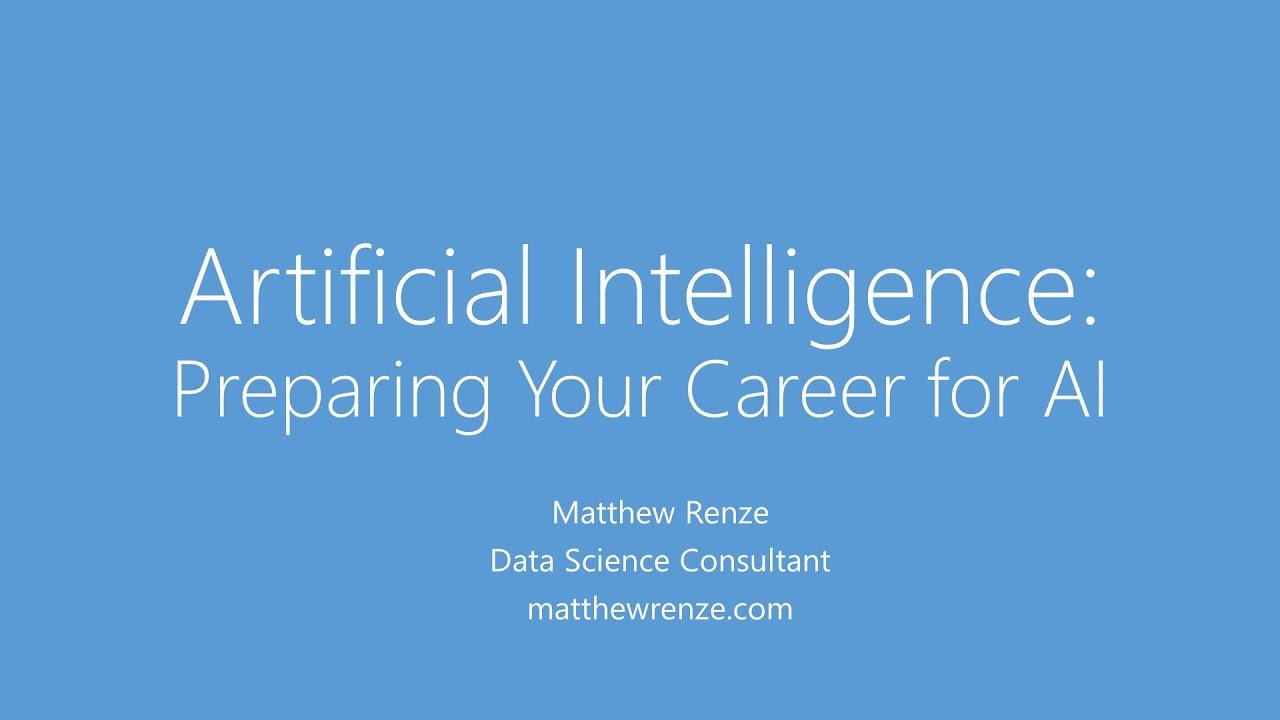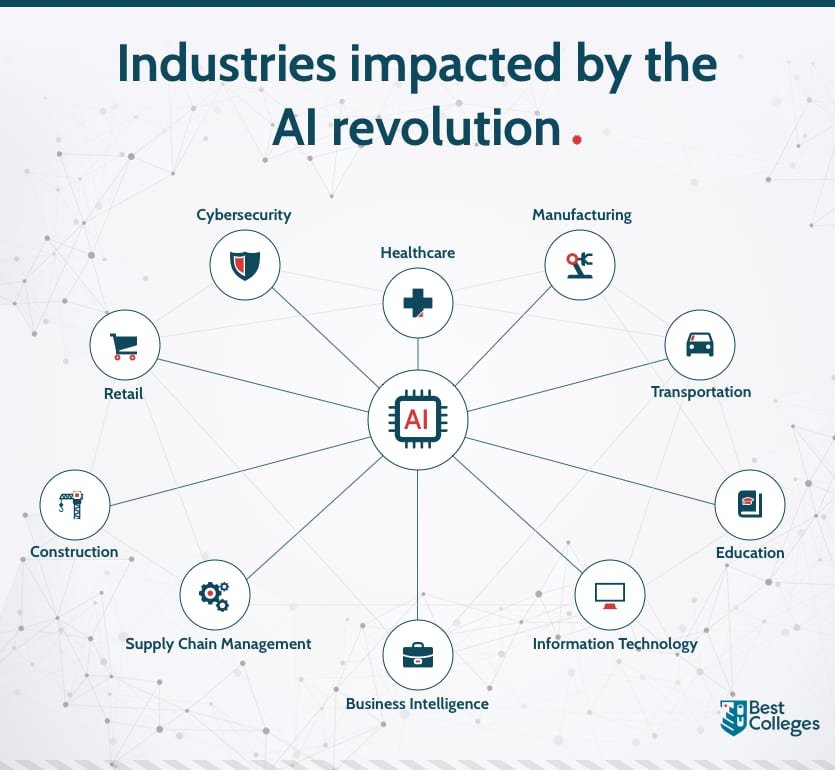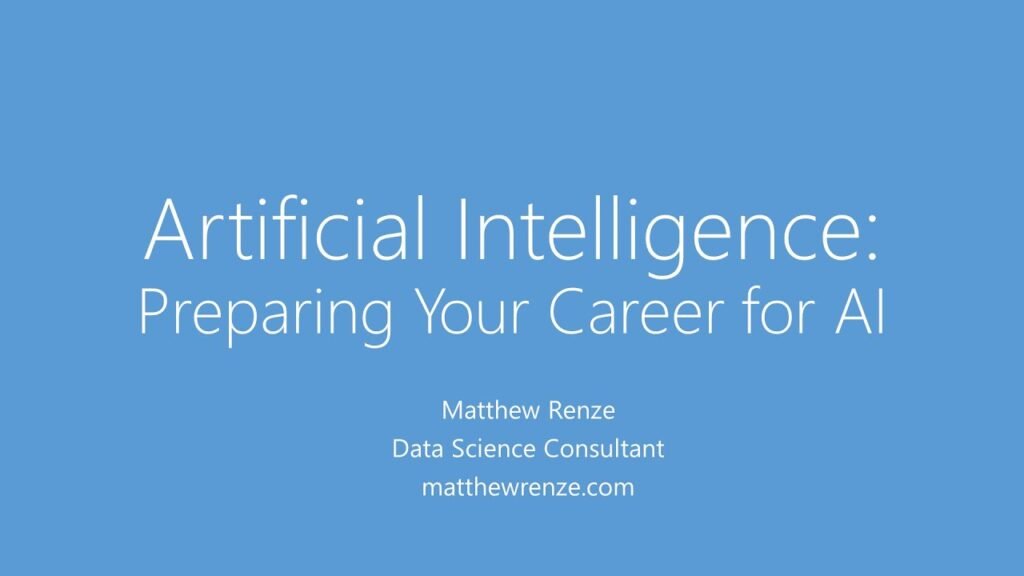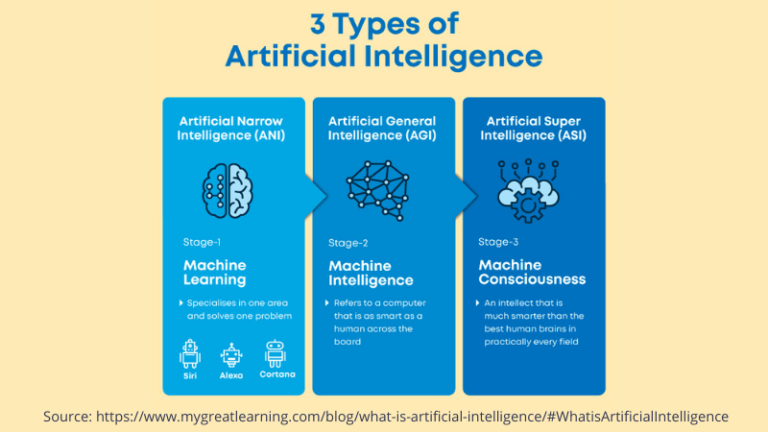How To Prepare For A Career In AI

Are you fascinated by the advancements in artificial intelligence and want to be a part of this rapidly growing field? In this article, we will provide you with valuable insights on how to prepare for a career in AI. Discover the essential skills, educational qualifications, and practical steps you can take to embark on a successful journey in the world of artificial intelligence. Whether you are a student exploring career options or a professional considering a transition, we’ve got you covered with the necessary information to set you on the right path towards a rewarding career in AI. So, without further ado, let’s dive in and explore the exciting possibilities awaiting you in this dynamic field.

This image is property of coursereport-production.imgix.net.
Education and Knowledge
Understanding the basics of AI
To embark on a successful career in artificial intelligence (AI), it is essential to have a strong understanding of the basics. This includes familiarizing yourself with the concept of AI, its history, and its various applications in today’s world. Take the time to explore resources such as books, online tutorials, and documentaries that provide an overview of AI. This foundational knowledge will provide you with a solid understanding of the field and help you make informed decisions about your education and career path in AI.
Pursuing a degree in computer science or related fields
A degree in computer science or a related field is a common path for individuals looking to pursue a career in AI. The curriculum typically covers subjects like programming, data structures, algorithms, and computer systems, which are all fundamental skills in AI. By obtaining a degree in computer science, you will gain a strong foundation in technical skills and develop the necessary problem-solving abilities that are essential for AI.
Taking specialized AI courses
While a degree in computer science is beneficial, it is also crucial to supplement your education with specialized AI courses. These courses dive deep into AI concepts and techniques, providing you with hands-on experience in areas such as machine learning, natural language processing, computer vision, and robotics. Look for reputable online platforms or universities that offer specialized AI courses to further enhance your knowledge and skills in this rapidly evolving field.
Attending workshops and seminars
Attending workshops and seminars is an excellent way to stay updated on the latest trends and advancements in the field of AI. These events often feature industry experts who share their knowledge and experiences, providing valuable insights into current AI practices and techniques. Additionally, workshops and seminars offer networking opportunities, allowing you to connect with professionals and potentially find mentors who can guide you on your career path in AI.
Continuous learning and staying updated
AI is an ever-evolving field, with new advancements and discoveries being made regularly. To stay relevant and competitive, it is essential to embrace a mindset of continuous learning. This can involve staying updated with the latest research papers, following influential AI experts on social media, and participating in online courses or webinars. By making learning a regular part of your routine, you will ensure that you are well-informed about the latest developments in AI and can adapt to emerging trends in the field.
Building Technical Skills
Learning programming languages
Proficiency in programming languages is a foundational skill for anyone pursuing a career in AI. Languages such as Python, Java, and C++ are commonly used in AI development. Python, in particular, is widely regarded as the go-to language for AI due to its simplicity and extensive libraries for data analysis and machine learning. Dedicate time to learning and mastering these programming languages, as they will be essential tools in your AI toolkit.
Gaining proficiency in data analysis and statistics
Data analysis and statistics are crucial skills for AI practitioners. AI systems heavily rely on data as their source of knowledge, and being able to analyze and interpret data effectively is essential. Gain proficiency in statistical methods, data visualization techniques, and data preprocessing. Understanding these concepts will enable you to extract useful insights from data, identify patterns, and make informed decisions when working on AI projects.
Understanding machine learning algorithms
Machine learning is at the core of AI and involves algorithms that enable systems to learn and improve from data without explicit programming. Familiarize yourself with key machine learning algorithms such as regression, decision trees, support vector machines, and neural networks. Understanding the principles behind these algorithms will equip you with the knowledge to implement and fine-tune them for various AI tasks, including image recognition, natural language processing, and recommendation systems.
Exploring natural language processing
Natural language processing (NLP) focuses on enabling computers to understand and interact with human language. As AI advances, NLP is becoming increasingly relevant in applications such as voice assistants, chatbots, and language translation systems. To build expertise in NLP, explore concepts such as sentiment analysis, named entity recognition, and text classification. Familiarize yourself with existing NLP libraries like NLTK and SpaCy, and experiment with building your own language processing models.
Developing skills in deep learning and neural networks
Deep learning is a subset of machine learning that focuses on training deep neural networks to solve complex problems. Neural networks, inspired by the human brain, are capable of learning and making predictions by analyzing vast amounts of data. Develop your skills in deep learning by exploring frameworks like TensorFlow and PyTorch. Learn about different neural network architectures such as convolutional neural networks (CNNs) for image recognition and recurrent neural networks (RNNs) for sequence generation. Building expertise in deep learning will enable you to tackle advanced AI projects and work on cutting-edge research in the field.

This image is property of d1m75rqqgidzqn.cloudfront.net.
Practical Experience
Participating in AI-related projects and competitions
One of the most effective ways to gain practical experience in AI is by participating in AI-related projects and competitions. These projects provide hands-on learning opportunities, allowing you to apply your theoretical knowledge to real-world problems. Seek out AI projects within your academic institution, join AI clubs or organizations, or participate in online AI communities where you can collaborate with other like-minded individuals. Additionally, consider entering AI competitions such as Kaggle competitions, which provide a platform for you to showcase your skills and learn from the AI community.
Completing internships or research opportunities
Internships and research opportunities are invaluable for gaining practical experience in AI. Many companies and research organizations offer internships specifically focused on AI, giving you the chance to work on real-world projects alongside experienced professionals. These experiences provide exposure to industry practices, mentorship opportunities, and the chance to deepen your understanding of AI concepts and techniques. Look for internships or research positions that align with your interests and career goals in AI.
Contributing to open-source AI projects
Contributing to open-source AI projects is a fantastic way to gain practical experience while making a meaningful impact in the AI community. Open-source projects are collaborative efforts where developers share their code and work together to improve AI tools and libraries. By contributing to open-source projects, you can enhance your programming skills, gain exposure to real-world AI codebases, and collaborate with experienced developers. Platforms like GitHub provide a wealth of open-source AI projects where you can contribute and learn from others.
Creating personal AI projects or applications
Creating your own AI projects or applications is an excellent way to demonstrate your skills and showcase your creativity. Identify areas of interest within AI, such as computer vision, chatbots, or recommendation systems, and develop projects that align with your interests. Build a portfolio of these personal projects, documenting your process, challenges faced, and the solutions you implemented. Personal projects not only demonstrate your technical abilities but also highlight your motivation and passion for AI.
Collaborating with professionals in the field
Collaborating with professionals in the field of AI can provide valuable insights and mentorship opportunities. Seek out AI professionals within your network or through online communities and express your interest in collaborating on projects or seeking guidance. Engaging with experienced individuals allows you to learn from their expertise, gain industry insights, and broaden your perspective on AI. Collaboration can take various forms, such as research collaborations, co-authoring papers, or even working together on AI-related business ventures.
Building a Strong Foundation
Strengthening mathematical and statistical knowledge
AI heavily relies on mathematical and statistical concepts, making it crucial to develop a strong foundation in these areas. Review and deepen your understanding of linear algebra, calculus, probability, and statistics. These mathematical tools are essential for understanding the algorithms and techniques used in AI, allowing you to design and implement AI models more effectively.
Enhancing problem-solving and critical thinking abilities
Problem-solving and critical thinking are vital skills for success in AI. AI professionals often encounter complex problems that require innovative solutions. Engage in activities that enhance your problem-solving skills, such as solving challenging programming puzzles, participating in coding competitions, or working on AI-related challenges. Practicing these skills regularly will strengthen your ability to think critically and creatively when faced with difficult AI problems.
Developing strong analytical skills
Analytical skills are essential for interpreting data, identifying patterns, and drawing meaningful insights in AI. Develop your analytical skills by working on data analysis projects, experimenting with various analytical techniques, and learning statistical modeling approaches. Being able to analyze and interpret data effectively will enable you to make informed decisions and improve AI models based on data-driven insights.
Improving communication and presentation skills
Effective communication and presentation skills are essential in AI, as it involves working collaboratively with others and being able to communicate complex ideas in a clear and concise manner. Practice delivering presentations on AI topics, participate in group discussions or debates, and write articles or blog posts to articulate your thoughts and ideas. Developing strong communication skills will enable you to effectively convey your ideas, collaborate with team members, and present your work to a larger audience.
Cultivating a passion for lifelong learning
In the rapidly evolving field of AI, it is important to cultivate a passion for lifelong learning. Embrace a growth mindset and stay curious about emerging technologies, research papers, and industry trends. Make it a habit to read AI-related books, follow influential AI researchers on social media, and stay engaged with the AI community through discussions and forums. By continuously learning and adapting to new developments, you will remain at the forefront of the field and be better equipped to tackle the challenges that arise in your AI career.

This image is property of cdn.analyticsvidhya.com.
Networking and Collaboration
Joining AI-related professional organizations
Joining AI-related professional organizations is an excellent way to network with like-minded professionals in the field. These organizations often host events, conferences, and webinars where you can connect with AI experts, researchers, and industry leaders. Such networking opportunities can lead to collaborations, mentorship, and valuable career connections. Research and join relevant AI organizations that align with your interests and career goals.
Attending conferences and meetups
Attending conferences and meetups focused on AI offers a unique opportunity to learn from industry experts, discover cutting-edge research, and network with peers. Conferences like the Neural Information Processing Systems (NeurIPS) or the International Joint Conference on Artificial Intelligence (IJCAI) bring together researchers and practitioners from around the world to discuss the latest advancements in AI. Additionally, local AI meetups provide a more informal setting to connect with professionals in your area. Regularly attending these events will keep you up-to-date with the latest trends, foster new connections, and inspire you to push the boundaries of your AI knowledge and skills.
Building connections through online communities
Online communities dedicated to AI are a valuable resource for learning, networking, and collaboration. Platforms like Reddit, Stack Exchange, and AI-focused forums offer opportunities to connect with AI enthusiasts, seek advice, and engage in discussions with experts. Actively contribute to these communities by asking and answering questions, sharing insights, and participating in relevant discussions. Building a strong online presence not only helps you expand your network but also exposes you to diverse perspectives and ideas in the AI field.
Engaging with AI experts and mentors
Establishing relationships with AI experts and mentors can greatly benefit your career development. Seek out opportunities to engage with experts in your field of interest, whether through networking events, social media platforms, or academic and professional connections. Don’t be afraid to reach out and express your admiration for their work, seeking guidance, or even exploring the possibility of mentorship. By learning from experienced professionals, you can gain valuable insights, receive guidance tailored to your career goals, and increase your chances of success in the field of AI.
Seeking collaborative projects and partnerships
Collaborative projects and partnerships provide opportunities to learn from others, gain diverse perspectives, and tackle AI challenges collectively. Look for opportunities to collaborate with fellow students, industry professionals, or researchers on AI projects. Whether it’s a research collaboration, a business venture, or an open-source project, working with others will expose you to different ways of thinking and enhance your problem-solving abilities. Through collaboration, you can leverage the strengths and expertise of others, making progress in AI that would be difficult to achieve alone.
Gaining Industry Experience
Seeking AI-related internships or jobs
Once you have developed a solid foundation in AI and gained practical experience, pursuing AI-related internships or jobs is an excellent way to gain industry experience. Companies across various industries, such as technology, healthcare, finance, and entertainment, are increasingly integrating AI into their operations. Research companies that are leaders in AI adoption and seek out internships or job opportunities that align with your interests and career goals. These experiences will provide firsthand exposure to industry-specific challenges and enable you to apply your AI skills in a real-world setting.
Working on real-world AI projects
Working on real-world AI projects, whether through internships, research opportunities, or collaborations, allows you to apply your skills and knowledge to solve tangible problems. Real-world projects often present unique challenges that require you to think critically, adapt to changing requirements, and collaborate effectively with diverse teams. By experiencing the dynamics of working on real-world AI projects, you will develop industry-relevant skills, gain exposure to the AI development lifecycle, and understand the considerations and limitations of implementing AI in practical settings.
Understanding industry-specific challenges and applications
Each industry has its own set of challenges and specific applications for AI. It is essential to develop an understanding of how AI is being applied in industries such as healthcare, finance, manufacturing, and transportation, among others. This knowledge will help you identify opportunities for AI integration and enable you to tailor your skills and solutions to meet industry-specific needs. Stay updated on the latest trends and publications within the industries you are interested in, attend industry conferences, and engage with professionals working in those fields to gain insights into their challenges and requirements.
Getting involved in AI research and publications
AI research plays a pivotal role in advancing the field and pushing the boundaries of what is possible. Consider getting involved in AI research projects, either through academic institutions, research organizations, or collaborations with professionals in the field. Conducting research allows you to delve deeper into AI concepts, contribute to the existing body of knowledge, and potentially publish your findings in academic journals or conference proceedings. Involvement in research demonstrates your commitment to academic excellence and can open doors to further opportunities in academia or industry.
Constantly adapting to industry advancements
The field of AI is characterized by rapid advancements and continuous innovation. To thrive in this dynamic industry, it is crucial to constantly adapt and stay updated on the latest developments and trends. Follow influential AI experts and thought leaders on social media, join mailing lists or newsletters from reputable AI organizations, and regularly read research publications and industry reports. By staying informed about emerging technologies, novel approaches, and industry best practices, you can position yourself as an AI professional well-equipped to navigate the ever-evolving landscape.

This image is property of res.cloudinary.com.
Developing a Portfolio
Creating a portfolio showcasing AI projects and achievements
A portfolio showcasing your AI projects and achievements is essential to demonstrate your skills and capabilities to potential employers or collaborators. Include a variety of projects that highlight the breadth of your knowledge and proficiency in AI. Additionally, provide documentation of your projects, explaining the problem statement, the techniques used, and the achieved results. A well-curated portfolio not only showcases your technical abilities but also demonstrates your ability to communicate and present your work effectively.
Documenting personal experiments and findings
In your journey towards a career in AI, it is inevitable that you will conduct personal experiments and make interesting findings along the way. Document these experiments, including the motivation behind them, the methodology employed, and the insights gained. This documentation showcases your curiosity, problem-solving skills, and ability to conduct independent research. Not only does it serve as an opportunity for personal reflection, but it also provides evidence of your passion and dedication to AI.
Showcasing problem-solving skills
Problem-solving is at the core of AI, and employers are particularly interested in candidates who can tackle complex AI problems effectively. In your portfolio and during interviews, emphasize your problem-solving skills and highlight specific challenges you have overcome in your AI projects. Discuss your approach to problem-solving, including the techniques and strategies you employed. Demonstrating your ability to analyze problems, break them down into solvable components, and devise creative solutions will set you apart from other candidates and increase your credibility as an AI professional.
Highlighting collaboration experiences
Collaboration is a key aspect of working in AI, and employers value candidates who can work effectively in team settings. Include examples of successful collaborations in your portfolio, emphasizing the roles and contributions you made to the project. Discuss the challenges faced during collaboration, how you navigated through them, and the outcomes achieved as a team. This highlights not only your technical skills but also your ability to communicate, collaborate, and work synergistically with others.
Demonstrating continuous learning and growth
Employers seek candidates who are committed to lifelong learning and personal development. Demonstrate your dedication to continuous learning by including evidence of courses you have completed, certifications you have obtained, or conferences and workshops you have attended. Showcase how you have evolved over time, drawing attention to the new skills and knowledge you have acquired. This highlights your adaptability, growth mindset, and commitment to staying up-to-date in the constantly evolving AI field.
Understanding Ethical Implications
Exploring ethical considerations in AI development and deployment
AI has the potential to shape our society and impact individuals on a global scale. Therefore, it is crucial to comprehend the ethical implications associated with AI development and deployment. Dive into topics such as privacy, fairness, accountability, and transparency in AI systems. Understand the risks and challenges associated with biased algorithms, data privacy, and the responsibility of AI practitioners. By exploring these ethical considerations, you can ensure that your AI projects are aligned with ethical standards and contribute to responsible AI practices.
Studying privacy and data protection regulations
Privacy and data protection are significant concerns in AI, as AI systems often rely on large amounts of personal data to function effectively. Familiarize yourself with privacy and data protection regulations such as the General Data Protection Regulation (GDPR) and understand the implications they have on AI development. Ensure that your AI projects adhere to these regulations and consider privacy concerns when designing and deploying AI systems.
Keeping up with discussions on AI ethics
The field of AI ethics is constantly evolving as researchers, policymakers, and the public engage in discussions about the ethical implications of AI. Stay informed about ongoing debates, papers, and industry initiatives around AI ethics. Join online forums and communities focused on AI ethics to engage in discussions and gain insights from different perspectives. Contributing to these discussions will enrich your understanding of ethical considerations in AI and foster a sense of responsibility towards developing AI systems that are fair, ethical, and accountable.
Understanding bias and fairness in AI algorithms
Bias in AI algorithms is a significant concern, as they can perpetuate existing societal biases and prejudices. Gain an understanding of the concept of bias in AI and the potential implications it can have on decision-making processes. Familiarize yourself with techniques for detecting and mitigating bias in AI algorithms. By proactively addressing bias and striving for fairness in AI, you can contribute to the development of more equitable and inclusive AI systems.
Advocating for responsible AI practices
As an AI professional, you have a role to play in advocating for responsible AI practices. Promote transparency, fairness, and accountability in AI by actively incorporating these principles into your work. Engage in conversations surrounding responsible AI development and educate others about the ethical considerations associated with AI. By championing responsible practices, you can help shape the future of AI in a way that benefits society as a whole.

This image is property of i.ytimg.com.
Seeking Mentorship and Guidance
Finding AI professionals as mentors
Finding experienced AI professionals who can serve as mentors is invaluable in navigating your career in AI. Seek out professionals who have advanced in the field and whose expertise aligns with your interests. Approach potential mentors with a clear and concise request, expressing your admiration for their work and your desire to learn from their experiences. A mentor can provide guidance, offer advice, and provide insights into the industry, helping you make informed decisions and accelerate your professional growth in AI.
Seeking guidance from professors or industry experts
Professors and industry experts are excellent sources of guidance and support during your journey to a career in AI. Reach out to professors and experts in the field who have expertise in AI or closely related fields. Attend office hours, ask for feedback on AI projects, or simply express your interest in AI to initiate a conversation. Their insights, feedback, and guidance can be invaluable as you navigate the complexities and challenges of pursuing a career in AI.
Joining mentorship programs and initiatives
Many organizations and institutions offer mentorship programs specifically designed to support individuals interested in AI. Explore mentorship opportunities in academia, professional organizations, or AI-focused companies. These mentorship programs pair you with experienced professionals who can guide you, provide career advice, and share their insights into the field. Participating in such programs not only facilitates learning and growth but also expands your professional network.
Benefiting from career counseling services
Career counseling services provided by educational institutions or career centers can be helpful in charting your career path in AI. These services offer individualized guidance, helping you identify your strengths, interests, and goals to make informed decisions about your education and career. Career counselors can provide resources, advice, and connections to help you develop a personalized plan for your AI career.
Utilizing online learning platforms and resources
Online learning platforms and resources offer a wealth of knowledge and support for individuals aspiring to a career in AI. Platforms like Coursera, edX, and Udacity offer AI-specific courses taught by industry professionals and leading experts. Additionally, online communities like AI Stack Exchange and Reddit provide platforms for asking questions, seeking advice, and engaging with a global AI community. Leverage these online resources to supplement your learning, gain insights, and connect with others who share your passion for AI.
Building a Personal Brand
Creating an AI-focused social media presence
Creating an AI-focused social media presence can be an effective way to build your personal brand in the AI community. Establish professional profiles on platforms like LinkedIn and Twitter, and share AI-related content, insights, and news. Engage with other AI professionals, thought leaders, and organizations by liking, commenting, and sharing their posts. By consistently showcasing your expertise and passion for AI on social media, you can attract like-minded individuals, expand your network, and position yourself as an active participant in the AI community.
Writing AI-related articles or blog posts
Writing articles or blog posts about AI-related topics is a powerful way to demonstrate your expertise and thought leadership. Create your own blog or contribute to established AI platforms, and share your insights, research findings, or personal experiences in the field of AI. Writing allows you to articulate your thoughts clearly, build credibility, and contribute to the knowledge base of the AI community. Regularly publishing well-written and informative articles can help you establish yourself as an authority in your area of expertise.
Contributing to AI forums and communities
Engaging with AI forums and communities allows you to connect with fellow AI enthusiasts, share knowledge, and collaborate on projects. Participate in discussions, answer questions, and contribute to the community by sharing your experiences and insights. By actively engaging in AI communities, you build your personal brand as an individual who is committed to helping others and advancing the field of AI.
Building an online portfolio and website
Having an online portfolio and website dedicated to showcasing your AI projects, achievements, and expertise can greatly enhance your personal brand. Create a professional and visually appealing website where you can display your portfolio, write blog posts, and provide information about your skills and experiences. Regularly update your portfolio and website to reflect your latest projects and accomplishments. A well-designed online presence not only helps you stand out in the competitive AI landscape but also facilitates networking and collaboration opportunities.
Sharing knowledge and insights with others
Sharing your knowledge and insights with others is a powerful way to build your personal brand and establish yourself as an expert in AI. Speak at conferences, participate in panel discussions, or host webinars where you can share your expertise, present your projects, and provide valuable insights to the AI community. Additionally, consider mentoring aspiring AI professionals, delivering workshops, or teaching AI courses to pass on your knowledge and contribute to the growth of the AI field. By sharing your knowledge and expertise, you position yourself as a respected authority in AI and contribute to the overall advancement of the field.
In conclusion, preparing for a career in AI requires a multifaceted approach that encompasses education, technical skills, practical experience, networking, personal development, and ethical considerations. By following the steps outlined in this comprehensive article, you will be well on your way to building a successful career in the exciting and rapidly advancing field of artificial intelligence. Remember, continuous learning, collaboration, and a passion for responsible AI practices will be key drivers of your growth and impact in the field. Good luck on your journey!






